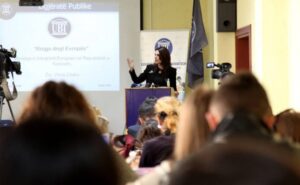
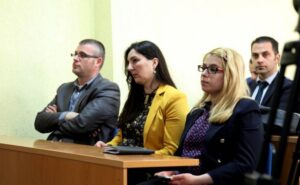
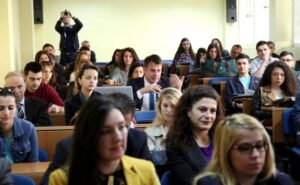
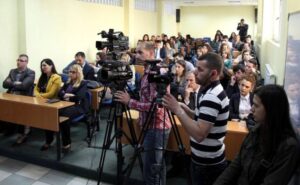
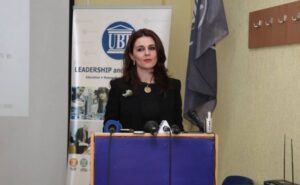
Stabilization and Association Agreement, and Visa Liberalization Process.
The full speech of Minister Çitaku
Honored students,
Honored Professors,
Greetings for all, and I am pleased to be among you today in order to share with you the achievements and challenges in our common path towards European Union integration.
In the course of a decade, the Republic of Kosovo faced with many challenges. We have passed a long way starting after the war for freedom, from an oppressive regime, and being developed in a functioning democracy, with stable institutions and a free market economy, where freedom of speech, religion, and the other fundamental rights are guaranteed.
Today, we are facing a new dawn for the Republic of Kosovo. A new era. An era of European integration. Kosovo strongly believes that Europeanization is the best way to move forward in improving the standard of life and to promote economic development for all citizens.
Kosovo is at the finalisation of negotiations on Stabilisation and Association Agreement (SAA). SAA will anchor Kosovo firmly on its path towards European Union membership and simultaneously it marks a historic momentum in relations between Kosovo and the EU.
Europeanization process is more than just the adoption of EU legislation and fulfilling of norms and standards of the EU. In different countries such as Poland, Hungary and Estonia with different historical and economic legacies and political tradition, the process of EU membership has brought rapid transformation of state-citizen relations, sustainable reform of public administration and a cycle of economic development, foreign direct investment and poverty alleviation reaching the most vulnerable groups and rural zones. The same transformative power of the European integration process has led to positive changes in our close neighborhood.
The government has repeatedly expressed its commitment to the European agenda – by deeds as well as by words. The core of our commitment is to support our citizens to changes that will transform our country into a proud member of the European family.
Kosovo has a clear perspective towards EU membership, in line with other countries of the Western Balkans.
In October 2012, Feasibility Study confirmed that Kosovo “… is primarily ready to start negotiations on the Stabilisation and Association Agreement.”
On 11 December 2012, EU Council confirmed that Kosovo will commence SAA negotiations, since four short-term priorities in the field of rule of law, public administration, protection of minorities and trade, were met. On 1 March 2013, Kosovo Government has confirmed to the European Commission that the country’s institutions have successfully met four short-term priorities that have been a condition for the opening of SAA negotiations. On 28 June the European Council formally adopted the mandate to commence negotiations on the SAA.
Therefore, by this is confirmed that Kosovo has a clear perspective towards EU membership, in line with other countries of the Western Balkans. The launch of negotiations on Stabilisation and Association Agreement between the European Union and our country is a milestone in the integration process of our country.
A successful negotiating process requires political will, defined organizational hierarchy, simple and clear procedures, technical expertise and involvement of all political and social stakeholders, including business, academy and civil society.
In this regard, on February 27, the Government of the Republic of Kosovo has established the negotiating team.
Negotiating team is headed by the Minister of European Integration, and the members are:
Minister of Foreign Affairs;
Minister of Trade and Industry;
Minister of Agriculture, Forestry and Rural Development;
Minister of Finance;
Minister of Economic Development;
Minister of Justice.
The negotiating team is mandated to lead negotiations at the political level and to provide a clear policy framework on technical negotiations.
Regarding the negotiators and negotiation working groups, the Government established three working groups:
1. Working Group on trade issues;
2. Working Group on approximation of legislation;
3. Working Group on cooperation policies.
Negotiating process to date
On 28 October 2013, the first official meeting is held at Chief negotiators level. This marked the commencement of SAA negotiations. Negotiations have begun with the opening of more complex chapters of SAA, respectfully chapters IV, V and VI.
The second round of negotiations continued with the second meeting of the Chief negotiators that was held on Nov. 27, 2013. During the meeting are opened for negotiation Section 1, chapter I, III, VII, VIII, IX and X.
During December 2013 were held the first meetings of technical working groups for the negotiation of the SAA. During February was held the second round of meetings of technical working groups which have continued with the discussion of all technical aspects of the SAA.
On 24 March 2014 is opened for negotiations the final chapter of SAA, namely chapter II of the Political Dialogue.
We expect, that during April, to finalize all negotiations on the chapters and to be concluded all technical issues. This will open the way for the holding of the third meeting of the Chief negotiators which will mark the completion of the negotiating process.
After technical finalization of negotiations, we expect soon to be set the date on the initialling of the Stabilization and Association Agreement, which will constitute the official conclusion of the SAA negotiations.
Following the initialling of the SAA, the SAA text will begin formal approval process in the European Parliament and the Council of the European Union.
Stabilisation and Association Agreement will be the first contractual agreement under which the Republic of Kosovo and the European Union will make mutual commitments: on the one hand, our country to undertake even deeper reforms, and on the other EU will provide a real opportunity for membership.
This is not simply a random response of the European Union toward Kosovo; it is the result of a meaningful strategic approach of the Government of Kosovo to the EU requirements, as well as the overall result of social progress and hard work of all state institutions at central and local level, position and opposition.
This work done in recent years by the government, not just technically but also diplomatically and politically has brought a different vision of the EU toward Kosovo and its European future.
The purpose of Stabilization and Association Agreement is to provide political and legal framework that will regulate the process of Kosovo approximation and membership to the European Union. The agreement would be the legal basis on all future steps of Kosovo in the process of European integration.
In this regard, the SAA is the next important step which has proved the maturity of our state and has sealed the legitimacy of the progress achieved.
Kosovo’s state-building process is irreversible and Kosovo is continuously being consolidated as the youngest European state. Since the declaration of independence, Kosovo has made tremendous progress in terms of recognition, either in the sense of joining the most important international organizations of which has strengthened our position in the world.
Visa liberalization
Regarding the visa liberalization, domestic institutions are committed to complying with requirements and recommendations of the European Commission. So far we have shown commitment and progress in all blocks related to visa liberalization.
The dialogue began in January 2012, while we received the roadmap in June of 2012. So far we have received only one report and now are waiting the next report which will assess the achievements of Kosovo.
Last modified: August 15, 2022
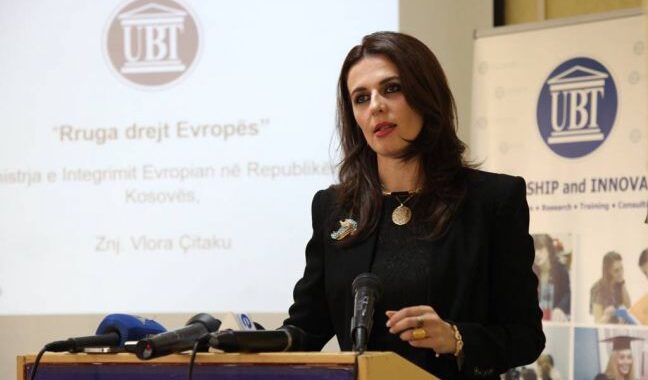
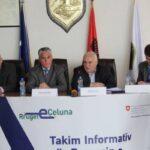









… [Trackback]
[…] Read More on to that Topic: integrimievropian.rks-gov.net/en/kosovo-is-continuously-being-consolidated-as-the-youngest-country-in-europe/ […]
… [Trackback]
[…] Read More here to that Topic: integrimievropian.rks-gov.net/en/kosovo-is-continuously-being-consolidated-as-the-youngest-country-in-europe/ […]
… [Trackback]
[…] Find More here to that Topic: integrimievropian.rks-gov.net/en/kosovo-is-continuously-being-consolidated-as-the-youngest-country-in-europe/ […]
… [Trackback]
[…] There you can find 47819 additional Information to that Topic: integrimievropian.rks-gov.net/en/kosovo-is-continuously-being-consolidated-as-the-youngest-country-in-europe/ […]
A big thank you for your blog post.Much thanks again. Will read on…
… [Trackback]
[…] Read More on that Topic: integrimievropian.rks-gov.net/en/kosovo-is-continuously-being-consolidated-as-the-youngest-country-in-europe/ […]
… [Trackback]
[…] Read More here on that Topic: integrimievropian.rks-gov.net/en/kosovo-is-continuously-being-consolidated-as-the-youngest-country-in-europe/ […]
Aw, this was an extremely good post. Spending some time and actual effort to make a really good articleÖ but what can I sayÖ I put things off a whole lot and don’t manage to get anything done.
… [Trackback]
[…] Read More on to that Topic: integrimievropian.rks-gov.net/en/kosovo-is-continuously-being-consolidated-as-the-youngest-country-in-europe/ […]